The far-right AfD declared its ambition to rise to power in Germany as its party congress kicked off yesterday with clashes between hooded demonstrators and police, just weeks after it scored record EU election results.
About 1,000 police were deployed in the western city of Essen, where demonstration organisers said 50,000 protesters marched towards the congress. The police have not yet provided figures.
“We want to govern, first in the east (of Germany), then in the west, then at federal level,” Tino Chrupalla, co-president of the Alternative for Germany (AfD), told around 600 delegates of the two-day meeting which start half an hour late due to street blockades.
Police added that they had used pepper spray and batons, and eleven officers were injured.
“Several disruptive violent actions occurred in the Ruettenscheld quarter. Demonstrators, some of them hooded, attacked security forces. Several arrests were made,” the police of North Westphalia, where Essen is located, said on X.
A top regional official had warned that “potentially violent far-left troublemakers” could be among the protesters.
In early June the Alternative for Germany (AfD) notched up its best European Union election result since its creation in 2013, winning 16% of the vote to take second place.
Chrupalla praised party progress at a local level and its strong European Union election result.
It was behind the main conservative CDU-CSU opposition bloc but ahead of Chancellor Olaf Scholz’s Social Democrats (SPD), which is in power at the head of a troubled three-party coalition.
The AfD congress comes ahead of three key elections in September in states that once formed part of communist East Germany, and where the AfD has been topping opinion polls.
“We are here and we will stay,” said party co-president Alice Weidel, opening the congress and drawing sustained applause.
Both Weidel and Chrupalla were re-elected to lead the party for another two years.
“We have the right like all political parties — to hold a congress,” she added.
Adding to the security forces’ headache is the Euro 2024 football tournament, with the last 16 clash between hosts Germany and Denmark taking place yesterday in Dortmund — not far from Essen.
Buoyed by a surge in immigration and a weak performance by Europe’s top economy, the party hit as high as 22% in opinion polls in January.
However their support faltered amid a welter of scandals that mainly implicated their top EU election candidate, Maximilian Krah.
“I believe that the party has learnt a lot in recent months and will be very careful when we put forward leading candidates in the future,” Weidel told the Politico news outlet Thursday.
Krah initially faced allegations of suspicious links to Russia and China.
He then sparked widespread anger by telling an Italian newspaper that not every member of the Nazis’ notorious SS was “automatically a criminal”.
The comments prompted the AfD’s expulsion from its far-right group, Identity and Democracy (ID), in the European Parliament, in which France’s National Rally (RN) and Italy’s League had been its partners.
While the AfD has sought to shift the blame for all its recent woes onto Krah, there were signs of problems even before.
The RN had already distanced itself from the AfD after reports emerged in January that the German party had discussed the expulsion of immigrants and “non-assimilated” citizens at a meeting with extremists.
The reports caused shock in Germany and triggered weeks of mass protests.
Following the EU polls, the AfD ejected Krah from the delegation it sends to Brussels but the ID group does not seem ready to re-admit them, leaving the party searching for new partners.

Delegates are protected by riot police as they leave a hotel ahead of the party convention of the far-right Alternative for Germany in Essen, Germany, yesterday. (Reuters)
